Whether you are a professional mechanic or a homebuyer, acquiring a jack is a good investment in your life, especially if you need to elevate your vehicle. When purchasing one, it’s a good idea to keep safety in mind and what type of things you need a jack for.
Are you going to be working on your brakes, stopping a leak, or changing a tire? You need to look at a trolley jack vs a floor jack. They essentially do the same thing but have fundamental differences.
Trolley Jack: Pros and Cons
Pros:
- Can be used on larger vehicles like vans, buses, and trucks
- Withstands weight of several tons
- Perfect for cars with low ground clearance
- Has a great lifting range
- Reduces the number of lifts needed
- Easy to install, adjust, and store
- Smooth wheels make it effortless to move
Cons:
- Set-up can be tricky (due to wheels)
- Doesn’t work well on gravel or uneven ground
- Not equipped to handle all vehicles
Floor Jack: Pros and Cons
Pros:
- The lifting pad is quite large
- Not a lot of effort is needed to use
- Can lift an average of 3-6 tons
- Has a hydraulic mounted cylinder
- Extremely strong and sturdy
- Works on small vehicles as well
Cons:
- Can be cumbersome
- The reach of other jacks can be higher
- Movement is often limited
Trolley Jack vs Floor Jack: How They Differ
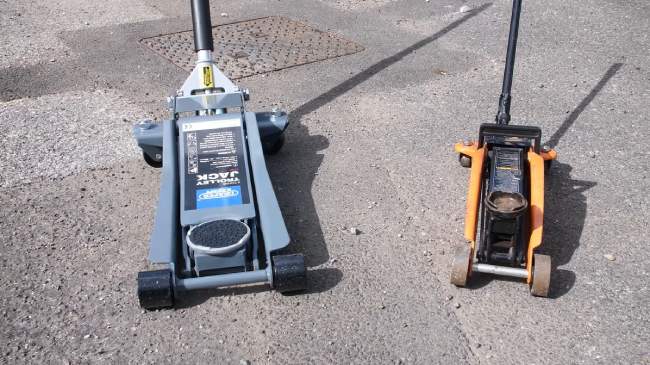
A Quick Look
| Comparing factors | Trolley jack | Floor jack |
| Size | Smaller | Bigger |
| Thickness | Thinner | Thicker |
| Portability | High | Low |
| Stability | Low | High |
| Movability | Backward, forward, and sideways | Usually moves forward and backward only |
| Set up | Hard | Easy |
| General uses | Home and DIY uses | Professional tasks |
| Lift range | About 10-15 inches | Average 14-21 inches or more |
| Low-end reach | About 5 inches | 3 inches or less |
| Weight capacity | 500 pounds to 3 tons | A small one will lift 1-5 tons, and a larger one will lift 12 tons |
| Types of jacks | Garage jacks, aluminum jacks, high-duty-cycle jacks, and home/light DIY jacks | Mechanic jacks and hydraulic jacks |
| Price | Cheaper | More expensive |
1. Construction and size
Trolley Jack
A trolley jack and floor jack are very similar in construction. They are usually both made of steel or aluminum. Trolley jacks, on average, measure about 20-40 inches in length, 6 inches in height, and a few inches in width.
Floor Jack
Floor jacks are generally bigger, thicker, and more expansive, making them more stable and dependable.
Winner
The winner in this category depends on your overall needs. Do you need to move it around easier or have a sturdier but bulky build? If you seek portability in your machine, then the winner in this category would be the trolley jack.
2. Ease of use and movement
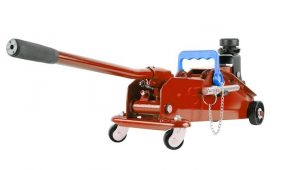
Trolley Jack
For the most part, trolley jacks are smaller and easier to use. They also frequently have swivel wheels which is a definite advantage over floor jacks since you can move them backward, forward, and sideways. Some floor jacks have this capacity, but it’s not very common.
Floor Jack
Floor jacks usually move forward and backward only. They are not as easy to move around since they are built to be bigger and bulkier.
Winner
The trolley jack is the winner for ease of use and movement.
3. Set-up
Trolley Jack
Setting up a trolley jack can be more complicated than setting up a floor jack. Remember to follow the directions closely and always keep safety in mind.
Floor Jack
Floor jacks are usually found in mechanic shops because of their weight.
Winner
The winner for easier set-up is the floor jack.
4. Working under the car
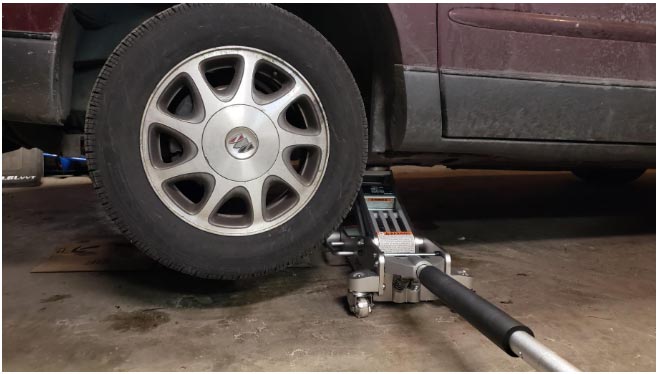
Trolley Jack
Trolley jacks are usually used for home use.
Floor Jack
Floor jacks are an excellent investment if you work under your car a lot. It customarily takes about 20 seconds to lift and put into place. That’s why professional mechanics use floor jacks over trolley jacks.
Winner
The winner depends on your professional and or consumer needs.
5. Lift-range
Trolley Jack
Trolley jacks usually lift about 10-15 inches. You can change tires and other small-scale jobs under your vehicle. They are restricted to about 5 inches of low-end reach.
Floor Jack
Floor jacks can lift an average of 14-21 inches and even more, depending on the machine. They typically have a low-end reach of 3 inches or less.
Winner
You need to consider a jack that will go low enough if you are working on low clearance vehicles. If that’s what you require in a jack, the winner is a floor jack.
6. Support to lift different vehicle types
Trolley Jack
Trolley jacks come in different weight classes, allowing other vehicles to be lifted. You can’t just rely on one specific trolley jack to handle all vehicles. Many people keep trolley jacks at home or in the trunk of their car. The wheels make it simple to slip into place.
Floor Jack
Floor jacks are a hydraulic, manually operated jack with a horizontal cylinder offering a low profile. This allows the jack to work on low clearance vehicles, but many prefer to use this type of jack to work on heavy-duty vehicles instead.
Winner
The winner for this category once again depends on your requirements.
7. Height
Trolley Jack
It would be best if you made sure to measure your vehicle’s clearance before purchasing a jack. If your car is lower than a jack’s minimum height, it won’t fit underneath. The amount of elevation you need will depend on what the task is. On average, 20 inches is suitable for many jobs except on vehicles like an SUV or Jeep, which will require a taller jack.
Floor Jack
A floor jack comes with a minimum and maximum height. Many models have extenders to raise the height of more oversized vehicles (trucks and vans).
Winner
The winner is, once again, dependent on what you need to do with the jack.
8. Weight capacity
Trolley Jack
Trolley jacks can lift 500 pounds to 3 tons of weight. Some can even be as efficient as a medium floor jack.
Floor Jack
Depending on the size of your floor jack will determine the weight capacity. A small one will lift 1-5 tons, and a larger one will lift 12 tons.
Winner
The winner is the floor jack.
9. Types of jacks
Trolley jack
a) Garage jacks (larger, sturdier, and significant for frequent vehicle lift)
b) Aluminum jacks (light, portable, and suitable for racing and track cars)
c) High duty-cycle jacks (durable, expensive, used in busy garages for lifting heavy vehicles)
d) Home/light DIY Jacks (less expensive and good for home garage)
Floor jack
a) Mechanic jacks (lightweight, compact, and can be used roadside for emergencies)
b) Hydraulic jacks (efficient, great lifting and motion force)
Winner
The winner will depend greatly on your needs. Are you looking for portability? Home use? Roadside assistance? Or do you require a heavy-duty jack because you work at a garage or in the service industry?
10. Price range
Trolley jack
Smaller and portable, they don’t cost as much as a prominent model floor jack.
Floor jack
It is possible to get a floor jack in a smaller size (which makes it as affordable as a trolley jack), but you must keep your needs in mind.
Winner
Overall, the trolley jack is the clear winner in price as it is less expensive than the floor jack.
When Should You Use a Trolley Jack?
A trolley jack’s primary purpose is to lift vehicles in minutes. The type of automobile a trolley jack can lift will depend on the size, model, and construction. They are designed and usually made with heavy-duty materials and can handle a large amount of weight and movement with maintaining overall smoothness.
When Should You Use a Floor Jack?
Floor jacks are often large and extremely sturdy. They can handle a vast amount of weight, lifting small cars to vans or trucks. They work with a handle that must be manually pumped. Use them when you need to work underneath your vehicle for tire or oil changes or for transmission upkeep.
FAQs
1: How do I choose the best floor jack?
Ans. It will need to hold the weight of your vehicle and will be able to fit underneath. You need to ensure that the maximum height is large enough for the tasks you need to do.
2: How do I use a floor jack?
Ans. Your vehicle needs to be on a stable surface. Turn your wheels the opposite way of your lift point. Install the handle of the jack and place it under the lift point. Pump the handle up and down to move it into position, then keep moving the handle until the height is what you need. Arrange your jack stands and lower the floor jack until you can remove it.
3: Are axle stands necessary?
Ans. Safety is always vital when lifting and working on vehicles. The short answer is, yes, you will need them to support your car safely. Don’t ever go underneath your vehicle with only the jack supporting it. Regardless of the type, trolley jack vs. floor jack, always use axle stands on level ground.


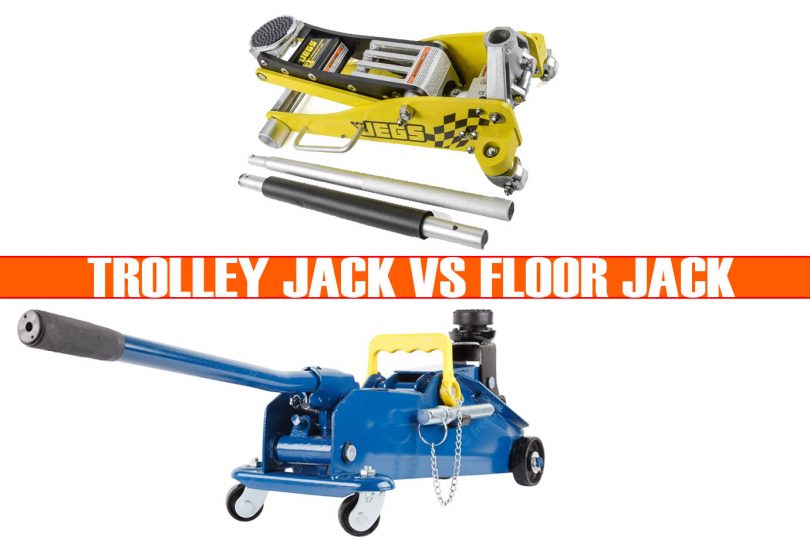





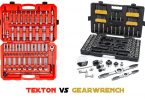

Leave a Comment